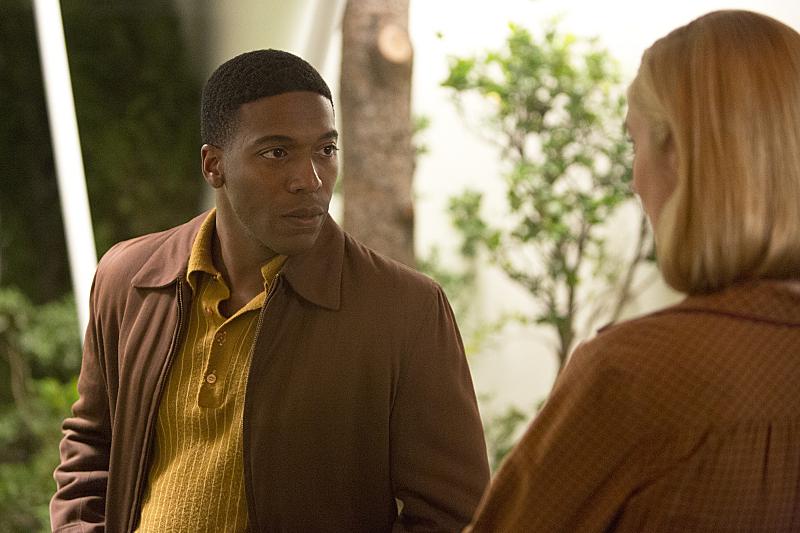On Sunday, for the eighth consecutive night since the Aug. 9 shooting death of 18-year-old Michael Brown, there was chaos and confusion in Ferguson, Missouri: Tear gas billowing in the streets, police officers threatening journalists, protesters fleeing to safety. Meanwhile, Showtime was airing “Blackbird,” the most recent episode of its period drama Masters of Sex. And, surprisingly, the show about two sexologists offered some historical context for what’s happening in Ferguson now.
The show is set in St. Louis at the beginnings of the Civil Rights movement. It features a mostly white cast, with Michael Sheen and Lizzy Caplan starring as the real-life researchers William Masters and Virginia Johnson, and for most of its first season the show paid little attention to race. But toward the season’s end, Masters’ pregnant wife Libby (Caitlin Fitzgerald) collapsed in the arms of her black plumber, whom she’d enlisted to give her dance lessons. After rushing to the hospital, the doctor asked her to have her “boy” wait outside. “He’s my … handyman,” was all she could offer in reply. In the season finale, she went into labor and was taken to the nearest hospital, which happened to be Buell Green, the one that serves St. Louis’ black community. “I can’t be here!” she protested.
In this second season, race has gradually come to the fore. Libby has hired Coral (Keke Palmer), a black nanny, to help care for her son, but she’s grown jealous of Coral’s ability to soothe her baby. When she discovers that her son has lice, she blames Coral, and eventually washes Coral’s hair with anti-lice shampoo, over Coral’s objections. (Coral doesn’t have the money to get her hair done again; Libby gives her a wad of cash.) Not long after the hair-washing incident, Robert (Jocko Sims), a “large colored man,” in Libby’s words, shows up on her doorstep and says he knows what she did to Coral and she better apologize. Libby instead badgers Coral to stop seeing this man, whom she assumes is Coral’s boyfriend. Coral is furious. “This here’s a good lesson of white people’s inability to take responsibility for their actions and do the right thing,” Robert says.
The same thing might have been uttered in nearby Ferguson this week. But the strongest contemporary parallels on the show emerge when Libby spitefully runs a background check on Robert with the help of a “friend high up in the police department.” It turns out that Robert has been arrested multiple times. When confronted with this information, Coral tries to explain to her boss that racial bias led to these arrests. Libby counters that “one of those arrests was for assaulting a police officer.” “They assaulted him first,” Coral tells her.
Masters, too, has revealed the depths of his ignorance and racism this season. He is now employed at Buell Green, where he and the hospital’s black director, Charles Hendricks (Courtney B. Vance), clash right away. After two racially charged incidents—one white patient fears for her Eldorado’s safety in “this neighborhood,” another puts a black patient in a headlock in the waiting room for “looking at my wife”—Masters complains to Hendricks that he is sure to lose patients from his previous hospital. Hendricks tells him and Johnson that he brought them to Buell Green to integrate his hospital and “move history forward.” Masters disappointingly replies, “I’m afraid history may be outside my purview.”
Just how little Masters cares about historical progress comes to light when a black reporter tries to write about both him and his sex study for the St. Louis Chronicle. After she inquires about his firings by two previous hospitals, Masters goes to the paper’s editor to make him pull a story that could “paint him as an ostracized and unstable figure.” If they run such a story, he says, he’ll publish a study that claims to validate widely held stereotypes about black people—that they have larger penises, greater sexual appetite, and elevated testosterone levels.
That threat culminates in a face-to-face standoff during which Masters insists, “I’m not the kind of man who would savage someone’s reputation.” But he is, of course, proposing to “savage” the reputation of every single black person by publishing a false study, a cowardly attempt to divert attention from a story that might taint his own good name. It is in its own way an abuse of the power and authority he wields, a fictionalized reminder of the very real history of racism in Missouri—and not only there.
Read the rest of Slate’s coverage of the protests in Ferguson, Missouri.
